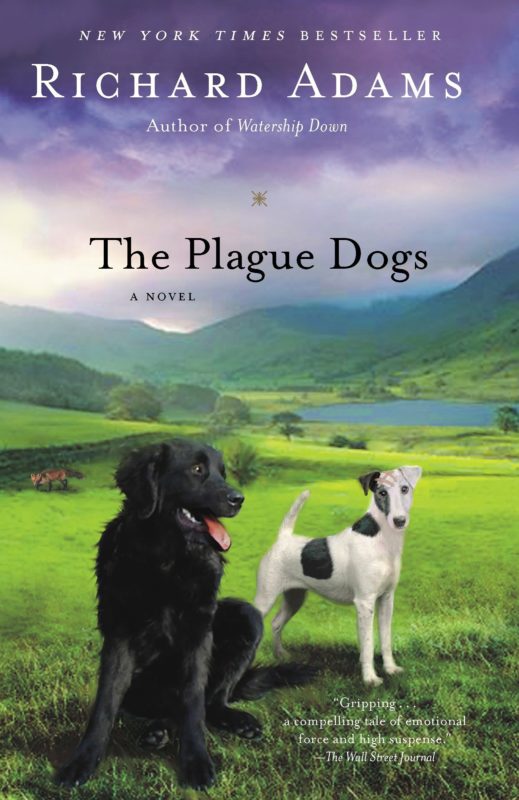
According to public opinion Richard Adams wrote just two books. Guess the first one, don’t win a prize. The Plague Dogs is his other one. It has parts that are audacious, tense, exciting, and well-written, but it has no parts as good as Watership Down. Read it for a greater appreciation of Adams’ debut, because it shows some of the ways Watership Down could have gone wrong.
Rowf and Snitter are laboratory dogs subjected to horrible medical research. After a careless janitor allows them to escape, they take refuge in the hills of England’s Lake District, preying on sheep to survive. Rowf is a weary, cynical mutt who’s given up. Snitter is a fox-terrier driven insane by experimental brain surgery. Combine their parts and you would have a single healthy pedigree animal. Their chances of survival aren’t good, but Snitter (who is a visionary similar to Fiver) has an idea that he might have once had an owner. Is it true, or another ghost from the crack in his head?
Meanwhile, scientists at the laboratory try to contain the story of the escaped dogs (and instead throw gasoline on the blaze at every turn). Soon Rowf and Snitter are mistakenly believed to be carrying a superplague, and half of Cumbria is out hunting them with rifles.
The Plague Dogs is indecisive, never sure of what it’s doing. At once it’s a grim satire, anti-vivisectionist propaganda, a “naturist” ramble through rural England, and a thrilling animal adventure. The parts sometimes work on their own but don’t become a harmonious whole.
The satirical scenes are as subtle as a gunshot to the face. The laboratory is called Animal Research, Science and Experiments (ARSE), the dialog between government bureaucrats sounds like Yes, Minister, muckraking journalist Digby Driver makes Rita Skeeter seem like Truman Capote, there’s a fat Fleet Street magazine editor whose name is Hogpenny because he’s fat, etc. It echoes Evelyn Waugh’s Scoop at times.
The ARSE scientists are comically evil, torturing animals on behalf of makeup and cigarette companies. The place is clearly intended as Pawschwitz: some day animal rights activists might abandon the Holocaust as a comparison, but not this day. Rowf and Snitter receive identifying numbers at the lab, which was alread troweling on the subtext, but Adams also can’t resist telling us that ARSE’s Dr Goodner used to be Dr Geutner and came to England via Buchenwald, at which point it stops being “subtext”, transcends being “text”, and becomes “clubbing the reader across the head”.
Digby Driver is implausibly lucky; always at the right place at the right time, always getting the right person to say the right thing. He should ditch journalism and buy lottery tickets. He’s also stupid: after unmasking Goodner’s identity, he blackmails him for information on the lab escape, as if a Nazi war criminal on the government payroll wouldn’t be a far greater scandal than two dogs running across the countryside.
It’s probably that most of The Plague Dogs’ readers wanted another animal adventure, but The Plague Dogs has little of Watership Down’s optimism. Adams’ rabbits were as capable as Navy SEALs and that book’s happy ending felt deserved, because Hazel and Bigwig and Fiver had earned it through their courage and cleverness. Rowf and Snitter are just helpless mutts by comparison, relying on luck and a helpful fox to survive. The Plague Dogs contains a lot of “the dogs are in trouble again, deus ex machina coming in 3…2…”
This might be The Plague Dogs’ big problem; the protagonists are animals in a story that only has room for humans. Rowf and Snitter can’t even understand (let alone influence) their circumstances, and this thrusts them into a passive role. To advance the plot Adams has to draw back the camera onto the human cast, almost to the point where Snitter feels abandoned by his author as well as his master. The Plague Dogs ends up being a cynical, dark, and sometimes funny book about human politics…between scenes of dogs huddling under a bush feeling scared.
Watership Down had the right idea by only giving us the rabbits’ point of view. Humans existed as supernatural forces akin to Greek titans: terrible monsters that left devastation in their wake. We didn’t need scenes of Berkshire politicians taking bribes and authorizing a construction project in Sandleford. That would have thrown the spotlight in too many different directions and onto too many characters, instead of the ones that mattered. The Plague Dogs commits this error, and becomes an extremely murky book.
And it lacks the largeness of its predecessor, its mythical heft. There’s no equivalent to the lapine language, no counterpart to the El-ahrairah stories. The only fantasies are the ones coming from Snitter’s damaged prefrontal cortex – and these aren’t thrilling, they’re sad, because we know what caused them. Animal experimentation is dreadful, and Adams’ show-offy allusions to classical literature seem out of place. The Plague Dogs is no epic in the mold of Virgil and Homer: it’s a bleak book about a bleak world where heroes don’t exist.
In 1982 Martin Rosen “adapted” The Plague Dog to film in his inimicable way. I remember a TV screen full of endless gray. It might be the most miserable film ever made about dogs (or tetrapods in general). At least Old Yeller spent most of his film not getting shot behind a barn.
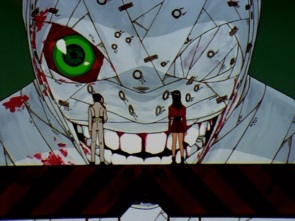
A goliath of the 90s. There are days when I think you could watch Akira, Perfect Blue, Redline, this, and then stop watching anime.
But it’s flawed! Few things this excellent contain so many problems. NGE is tonally disjointed: the early “monster of the week” episodes look cheesy next to the later psychologically-driven episodes. The plot is always unclear and often incoherent, full of mystifying exposition dumps (ep20: “We can surmise that Shinji’s body lost its ego border, and he’s floating in the entry plug in quantum form.” […] “All of the substances which composed Shinji are still preserved in the plug, and what could be called his soul exists there as well. In fact, his self-image is pseudo-substantiating his plug suit.”) that create far more heat than light.
The story – to the degree it’s comprehensible – is riven with logical issues and internal contradictions. NGE has plot holes that simply can’t be closed no matter how hard you try. Fans have been analyzing this show for twenty five years without success: utterly basic questions such as “what’s an Angel?” and “what’s [character] trying to do?” are still unanswerable mysteries that spawn 10+ page forum flamewars in their wake, with users quarreling over the definition of some Japanese word or conducting exegesis of an offhand statement made by Hideaki Anno in a fanzine interview.
It’s a credit to NGE that fans are willing to take the effort. It’s an indictment that they need to. There simply aren’t any answers to a lot of NGE’s questions: just provisional rules that change from episode to episode, and from media to media. Given that SEELE knows the truth of Kaworu’s identity, why do they tell him what’s inside Terminal Dogma in ep24? Why does he then act surprised at what he finds there? Why can’t he sense Adam’s location, the way Gaghiel can? Given that the Spear of Longinus can instantly kill an Angel, why doesn’t Gendo use it until the Arael battle? Why is SEELE so angry about losing the Spear when they can create replicas? Which souls are in which Evas? Which numbers belong to which Angels? Does Eva-01 come from Adam or Lilith? What’s with Gendo’s habit of sending out Evas one at a time to fight an Angel, instead of all at once? How is the Third Impact triggered? Anime in general creates a lot of fanfic. NGE all but conscripts you to make fanfic, because the only way the show makes sense is if you rewrite it.
Most NGE fans would concede that the show looks smarter than it is. All the allusions to Christian mythology and Freudian theory mostly just turn out to be decorative wallpaper in the end, unrelated to the show’s main concerns. Why are Ritsuko Akagi’s computers named after the Biblical Magi? Because it sounds cool: there’s no deeper meaning and there’s almost never a deeper meaning. Westerners wear shirts with Kanji letters without caring what they mean, and NGE does the same for the Western intellectual canon. This isn’t always true (there’s some surprising philosophical acuity at times), but NGE occupies an uncanny valley of fun. It’s too hard for people who just want to watch giant robots fighting, but has too many generic seinen elements for fans of highbrow anime like Serial Experiments Lain.
But NGE does a lot of things right.
At the risk of sounding ten years old, the fight scenes look great. Maybe too great – they were fires that burned through Gainax’s modest budget, forcing a restructuring of the show’s final two episodes that remains controversial to this day. Basically, Anno’s big innovation was to fuse the then-stale mecha genre with biology. The “eva” mechas (piloted by children such as Shinji Ikari as humanity’s last line of defense against dimension-crossing “angels”) are cyborgs created from the flesh of Adam, the first being. It’s strange how this tiny detail completely fixes the fundamental problem with mecha genre: you’re watching hunks of metal punch each other, which gets dull. Eva’s battles are visceral and satisfying. When a punch lands on one of Hideaki Anno’s nightmarishly-designed monstrosities, you wince: you feel the flesh being pulverised. No matter how outlandish or surrealist NGE becomes, it remains a gruesome mortician’s table of a show: focused on bodies and mortality. Being an eighty-foot giant is not a reprieve from suffering: it just means you rot all the more.
The visual design of the Angels is superb, and their variety allows NGE to have its fingers in many pies. Fights involving bipedal Angels have a glorious city-smashing kaiju/tokusatsu character, the insectile Matarael evokes the “giant bug” movies of the 1950s, the aquatic Gaghliel echoes It Came from Beneath the Sea, the space-based Angels could be read as references to Leiji Matsumoto’s spacefaring adventures, and the bodyless Angels allow for tense Outer Limits-style conflicts that are fought in a psychological or emotional domain. The bizarre Leliel stands out as a wholly unique creation – I’ve never seen anything like it before, either within anime or outside it.
The editing is also excellent, full of slam-bang intercuts, and deliberately jarring transitions. The abrupt black title cards alone are a NGE trademark. Anno has a talent for overstimulating the senses that can best be described as Artaudian: happy music plays over tragic events, we sometimes view shots from deliberately awkward angles, or lose contact with a scene just as we’re on the verge of understanding it. It’s very hard to be bored while watching NGE. The material on the screen is as infuriating and fascinating as an optical illusion or a mirage.
And although NGE often looks smart when it’s not, it’s also looks dumb when it’s not, too. Newcomers to the show (who might have been recommended NGE as a thinking man’s anime) are often struck by how it clings to the genre’s basest cliches. Partly this is because NGE rebuilt the industry in its image (Rei Ayanami and Asuka Langley Soryu were influential in establishing the kuudere and tsundere archetypes, respectively), but the more gratuitous fanservice moments were embarrassing even in 1995. The basic plot (a fourteen year old kid gets to save humanity in a giant robot while hot girls fight over him!) is wish fulfillment from a kid who gets bullied either too much or not nearly enough.
But as the show progresses, you soon see what Anno is doing: commenting on the cliches of mainstream anime. There’s playful subversion – the way the stale “harem” setup gets deep-sixed by an implied male-male relationship for Shinji, for example. The show as a whole reads almost like a knowing parody: it’s mocking itself, mocking you for buying into it. Most of the characters reach a fate that’s very out of line for their pre-set archetypical roles (the “mother figure” is quietly and cruelly destroyed, the tsundere’s psyche is snapped in half, etc), and this must have been intentional. Anno was gathering every up cliche and stereotype he could, and then throwing it all off a cliff.
He was right to. Anime is stylish and fun, but it can also be very limited. Its aesthetic choices will rise up around you like prison bars if you let it. Go on Crunchyroll and contemplate the sheer sameness of anime. How many shows are being made with exactly the same story? How many magical schoolgirls? How many harems? There are other ways of being, other stories to tell, and NGE embraces anime’s cliches just so it can destroy them publically in front of you, like the Inquisition burning heretics in an open village square.
Some have described NGE as “otaku-therapy“. I’m not sure that I’d go that far, but there’s a strong sense that Shinji is supposed to be you. NGE‘s final two episodes ram this home with startling force: how much of yourself will you give up to belong? Shinji is offered a choice to become part of a hivemind, or remain his own person. He makes his choice. Certain anime fans make theirs.
And NGE absolutely does have things to say about philosophy. It integrates Jungian theory (shadows, masks, the subconscious collective) and Schopenhauer (the Hedgehog’s Dilemma) into the plot in a way that makes sense and feels natural. It’s clearly made by someone intelligent – so how to explain the show’s sloppier plot elements? You’d almost wonder if NGE’s story even matters in the slightest, or if its plot is just more disposable-and-disposed-of cliche. By subjecting its plot to logic, we might be putting decorative furniture under a vice and hydraulic press. Yes, it shatters, but they were never the load-bearing part of the house.
In a breath, I would say that NGE entertains the casual viewer (“robots fighting each other, dude!”), disappoints the deep viewer (“the story doesn’t make sense!”), and entertains the really deep viewer (those who look past the story altogether, and view it as a kind of referendum on anime genre itself, as well as the toxic fanbase.) There’s a lot going on in NGE, and you have to look past battling robots to see it. It’s an anime almost impossible to stop thinking about. It raises issues that stick in your mind like particles of grit, refusing to leave. Grit is irritating and painful, but pearls are forged upon such.
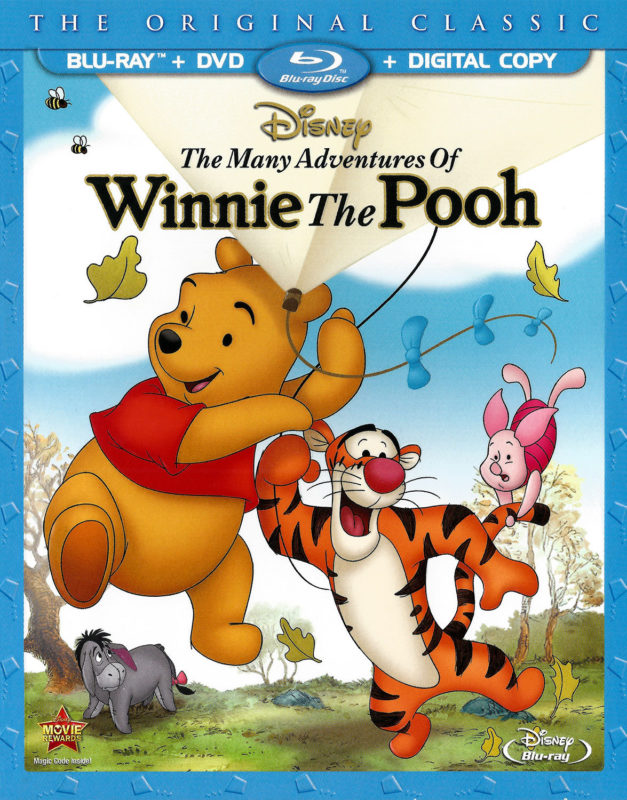
In this upsetting and unfair Xi Jinping biopic a cartoon bear wanders around the woods making bad decisions and singing songs. It’s one of the few classic Disney films I hadn’t seen. I thought that watching it would restore my sense of childhood wonder, then I remembered I never had a sense of childhood wonder.
If you’re wondering what constitutes “many”, it’s three. The film contains the featurettes “Winnie the Pooh and the Honey Tree” (1966), “Winnie the Pooh and the Blustery Day” (1968), and “Winnie the Pooh and Tigger Too” (1974), which hail from the Wolfgang Reitherman era of the company and serve as reasonably accurate adaptations of select AA Milne stories.
The animation has that rough 60s Disney quality, where you can almost see flickers of pencil schmutz. Vocal talent includes Sterling Holloway as Pooh, John Fiegler as Piglet, and Stan Freberg as a “laughing honey pot” (he was not credited for this monumental role, in an injustice Tinseltown has yet to reckon with). The total running time is just 74 minutes. This didn’t seem particularly short in 1977 (Dumbo is exactly an hour and four minutes long), although it does now that multiplex theater timeslots are forged in titanium.
“Winnie the Pooh and the Honey Tree”: Winnie the Pooh is a revolting fatbody who eats everyone’s honey while remarking that he’s “grumbly in his tumbly (sic)”. He becomes so fat that he gets stuck in Rabbit’s tunnel, and the entire gang (including a gopher who isn’t in the original book) combine their talents to free him. Pooh looks disgusting in his red shirt – buttocks protruding. Very very disrespectful.
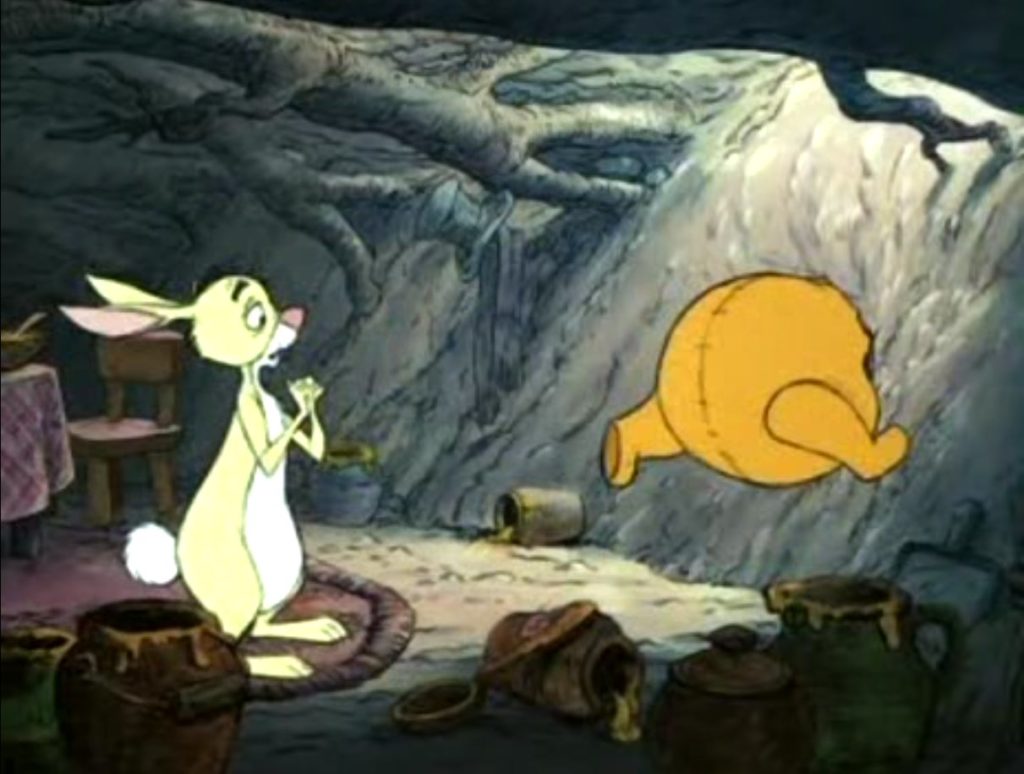
I wonder why certain creative decisions were made. Why does Pooh keep his HUNNY on the highest shelf (which he can only reach while standing on a chair?) Is he stupid? Or does it hint at hidden character depth – Pooh subconsciously trying to break his HUNNY addiction, the way a compulsive smoker might “hide” their cigarettes?
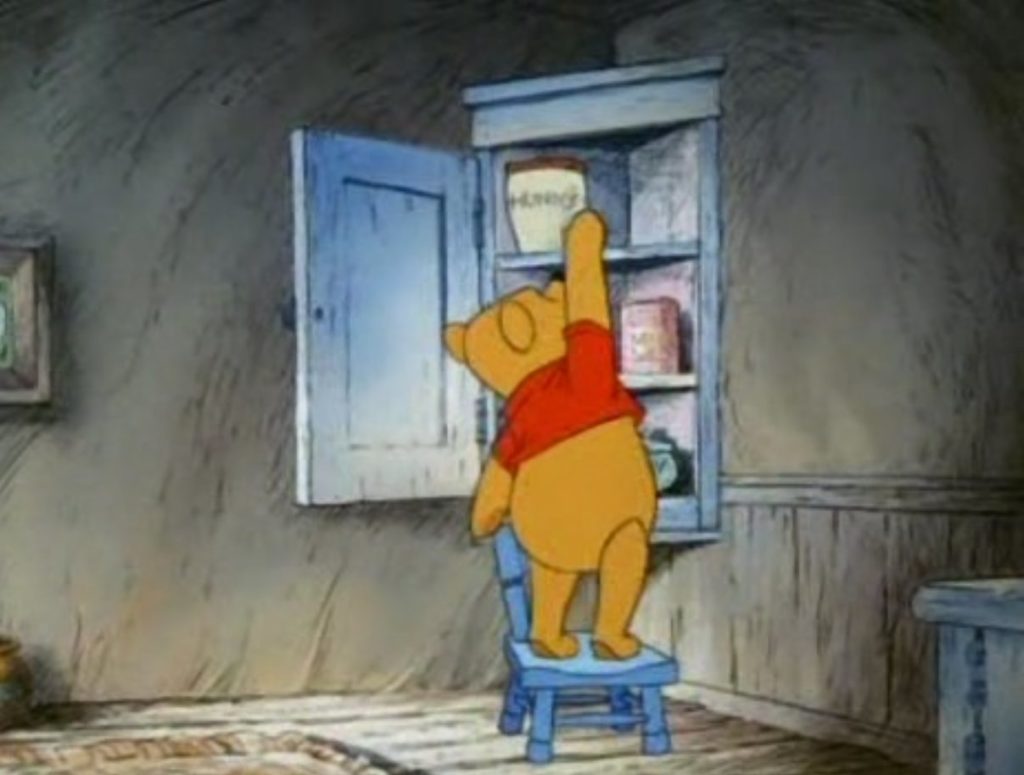
The most probable explanation is to fit the music to the action cues. The shot begins with sixteen bars of music remaining (“with a hefty, happy appetite, I’m a hefty, happy Pooh!” x2), and Pooh must waste a few seconds doing something (like fetching a chair) for the song to end at the triumphant moment he grabs the HUNNY.
Also, Pooh can rotate his head 360 degrees. This might have gotten laughs in 1977; now it looks like The Exorcist.
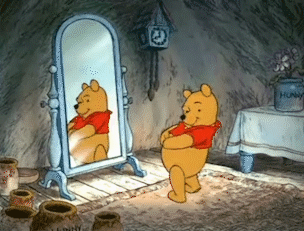
“Winnie the Pooh and the Blustery Day” sees Hundred Acre Wood being flooded by a fierce storm, with all the animals being washed away atop various bits of detritus while regretting their decision to vote for Bush. It contains an eerie dream sequence where Pooh floats out of his body and has a nightmare about heffalumps. Doug Walker used to call these “Big-Lipped Alligator Moments” – animated sequences that are completely pointless, nightmarishly over-the-top, and never referenced again. It’s also notable as the introduction of Tigger, whose name I don’t enjoy typing. My left index finger is millimeters away from an incident. A wiser man would play things safe and call him Tigga, but I persist.
As with Mickey Mouse and the Beanstalk, the film frequently breaks the fourth wall, or rather the fourth page. The narrator will hold conversations with characters in the book, and so forth. This gets tiresome, although it allows for some fun animation.
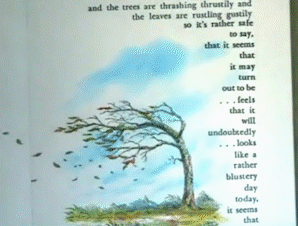
“Winnie the Pooh and Tigger Too” is about a bouncing Tigger who bounces too much and gets stuck up a tree at the top of the page. He learns that he’s scared of heights. His friends tell him to stop being a pussy and come down, but he simply can’t, and eventually the narrator intervenes, rescuing poor Tigger by folding the page. There’s another Big-Lipped Alligator Moment. There’s a poignant animated scene that was possibly created for the film’s release (I’m not sure), detailing Christopher Robin’s plans to go to school and perhaps get on lithium to stop his hallucinations of talking animals.
Winnie the Pooh belongs to Disney and will continue to do so until at least 2026, when the character enters the public domain. Pooh’s ownership history is complicated – in 1930 AA Milne sold the character to someone called Stephen Slesinger, who died in 1953, at which point his widow licensed the rights to Disney in exchange for regular royalties. Lawsuits from Slesinger’s estate ensued, alleging that Disney was welshing on said royalties. This resulted in a decades-long legal slapfight that descended into low comedy – apparently Slesinger’s estate literally hired goons to rake through Disney’s trash for shredded documents. Pooh is big business, bringing in billions of dollars a year. It’s not impossible that Disney would have been bankrupted in the 1980s without the Pooh MUNNY jar.
What led Walt to acquire the rights to AA Milne’s Pooh stories, and thus (probably) save his own company? Apparently, his daughter liked them. That was all it took.
If Diane Disney had possessed different reading tastes, the Disney canon might look totally different. Lady Chatterley and the Tramp, or The Rescuers Down and Out in Paris and London, or Make Mein Kampf, or The Dalmatian With A Hundred and One Young. HP Lovecraft owned a cat. It wasn’t called Tigger.







